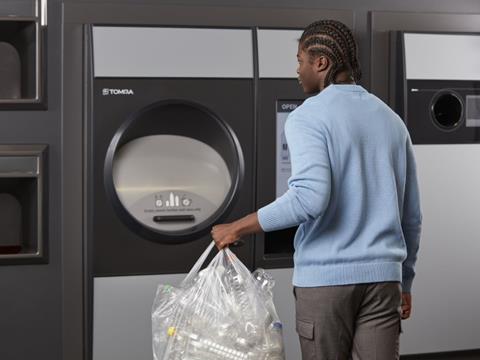
TOMRA’s latest report has examined the impact of in-store deposit return systems on European consumers that recycle over 50 drink containers at a time, aiming to help retailers increase traffic and brand loyalty for their stores.
The study held online survey panels amongst 1000 Swedish, Norwegian, Finnish, Danish, German, Dutch, and Slovakian consumers in November 2022. All consumers were between the ages of 18 and 70 and claimed to return drink containers for recycling at least every second month.
15% of the total survey sample are described as high-volume recyclers, meaning they recycle over 50 bottles and cans every time they visit a store and have the highest potential deposit refund. These consumers tend to be younger, live in larger households, have greater access to a car than the general survey population, and spend more money on commodity goods such as groceries every month.
Norway, Denmark, and Sweden saw the highest percentages of high-volume recyclers in the total surveyed population at respective percentages of 20%, 22%, and 28%.
Apparently, 83% of high-volume recyclers spend their deposit refund in the same store, suggesting that they recycle and shop on the same trip – and that, by implementing reverse vending machines, retailers could attract new, environmentally conscious customers.
Well-functioning reverse vending machinery was reportedly the most important factor in choosing a store for recycling amongst high-volume recyclers. This was especially true in Slovakia (73%), Finland (74%), and Germany (82%).
The quick recognition and processing of containers was named as an important feature by 86% of the total surveyed consumers, as well as for 91% of surveyed Finnish consumers and 89% of surveyed Norwegian and Swedish consumers. Amongst all consumers surveyed, multi-feed reverse vending machines prevailed as a popular choice, with 81% of Norwegian, 79% of Swedish, and 63% of German consumers being inclined towards this particular system.
58% of surveyed German consumers, and over 40% of their Norwegian and Slovakian counterparts, stated that long queues or downtime would deter them from using a reverse vending machine in a particular store.
Cleanliness was also noted as an important factor, with high-volume recyclers expressing their desire for handwashing facilities and bins nearby the reverse vending machines.
Easy use (89% of all consumers surveyed), the ability to return all container types to the same machine (83%), having staff on hand in case of difficulties (83%), the ability to recycle multiple containers at once (67%, compared to the total study population at 48%), and the availability of several reverse vending machines (59%, compared to the total study population at 48%) were amongst the other requirements.
TOMRA hopes that retailers will utilise these findings to improve their recycling facilities and incentivise high-volume recyclers to come to their stores, thus increasing loyalty and revenue for their businesses.
“Our research sought to understand what consumers want from an in-store recycling experience,” says Mette Mari Heyerdahl, head of Marketing at TOMRA Collection. “The survey findings demonstrate that recycling customers not only bring footfall to stores, but also revenue. When stores invest in their reverse vending facilities, they tap into a vital opportunity.
“By translating our report into in-store action, retailers can harness the power of reverse vending and gain a competitive advantage for their business, all while playing their part in reducing plastic pollution in their community and making a difference to the environment.
“Considering multi-feed options such as TOMRA R1 is one way to meet, and even exceed, high-volume recyclers’ expectations. Ensuring you have sufficient machines to meet demand, that they can accept all types of containers, are intuitive for customers to use, and that uptime is maximized, are big plus points too.
“But no matter which RVM setup you opt for, ensuring the recycling area is clean, tidy and has as little wait time as possible gives customers a positive experience and makes repeat custom almost second nature.”
In another report, TOMRA claimed that functional reverse vending facilities were the third most popular consideration amongst consumers seeking to dispose of their empty beverage packaging, with efficiency, environmental benefits, and financial incentives driving consumers’ recycling habits.
Its introduction of five new reverse vending machine concepts for beverage containers earlier this year included new technological developments, the implementation of AI, and a series of new, sustainably-minded designs.
If you liked this article, you might also enjoy:
McKinsey on whether or not on-pack sustainability claims affect consumer spending
A deep dive into the most important packaging sustainability trends and solutions














No comments yet